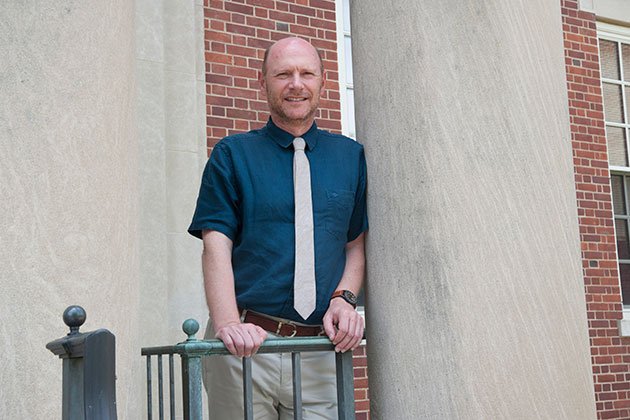
Gerry Altmann may not have actually written the book on cognition, but he has been editor of Cognition, the world’s flagship journal serving cognitive psychology and cognitive science, for the past seven years. And he has an international reputation for his work in the psychology of language. When UConn began searching for someone to join the expanding cognitive science program in the College of Liberal Arts and Sciences, with its emerging focus on language and the brain, Altmann’s name immediately made the short list of candidates.
Currently a professor of psychology at York University in England, where he teaches both introductory and advanced courses in psycholinguistics, as well as a master’s level course in research design and statistics, Altmann will officially join the UConn faculty as part of the University’s ambitious faculty hiring program in the fall of 2014.
Unofficially, he is already in frequent contact with his future colleagues on the Storrs campus and, as he says, “I already feel at home because I’ve spent so much time in the ‘States’ over the years.” Part of his time in the U.S. is due to his service on the Language and Communication (LCOM) grants review panel of the National Institutes of Health (NIH) from 2005 to 2010.
Altmann earned his Ph.D. in artificial intelligence at the University of Edinburgh, and subsequently taught at the University of Sussex before joining the psychology department at the University of York. He is widely published, and is author of The Ascent of Babel: An Exploration of Language, Mind, and Understanding (Oxford University Press 1998) that was the winner of the British Psychological Society Book Award in 2000.
His current research focuses on how we map language into our visual environment. Altmann says he studies language by monitoring eye movements. “I study how we process what goes in through the ears by studying its effect on the eyes. I’m interested in how language can direct attention around our external world, and in how our perception of that external world might influence our interpretation of language relating to that world.”
He explains it this way: It turns out that if you hear the sentence, ‘The student will ride the bike,’ and simultaneously see a number of things, including a bike, you’ll look at the bike during the word ‘ride.’ And if you hear, ‘The student will ride the bike over to the shed and then he’ll clean the bike,’ when you hear the second ‘bike’ you won’t look so much at the actual bike, but will look more at the shed – i.e., where in your mind the bike will be during the cleaning.
In fact, if the bike and all the other things are gone by the time you hear the language, you look to where the shed had been. “So what matters,” Altmann says, “is not so much what you see, or remember seeing; what matters is what’s in your mind. It’s this that drives attention to the world around us.”
Recently, Altmann has been collaborating with researchers at the University of Pennsylvania on fMRI studies of how the brain keeps track of the changes that objects undergo when events conspire to alter them.
He says that to understand something as simple as a bicycle tire getting a puncture requires that the brain retrieves the right version of the tire, depending on how we refer to it – ‘it had been fine this morning’ vs. ‘now it’s no good.’
“It might sound simple,” Altmann says, ”but we apparently know nothing about how the brain manages to represent distinct versions of the same object as being the same object. The two versions create a kind of conflict in our mind’s eye, and we don't yet understand how the brain manages to retrieve the right version depending on the language we use.”
Because he has had professional affiliations on both sides of the Atlantic, the fact that he is moving his research to the U.S. may not be surprising. Altmann has, after all, many friends and acquaintances on this side of the pond. But when asked about his interest in joining the psychology faculty at UConn, he says, “When I began talking to people [in Storrs], I was immediately impressed with what I learned about Next Generation Connecticut, about the University’s commitment to STEM … I just sensed that there’s real vision for the future, and a serious commitment to both teaching and research.”
One of the things that intrigues him about university-level education in the U.S. is the difference in graduate studies. “I enjoy teaching at all levels,” he says, “but a key difference with graduate students is that in the UK someone can earn a Ph.D. in three years. That doesn’t give them much time to get into their research and develop problem-solving skills. In the U.S., by the time students are working on their thesis, they already have at least a couple of years of graduate-level training. That facilitates much broader exposure to their chosen field.
“That’s not to say,” he adds, “that the different students are any more or less intelligent. It’s just that the two systems are different, and I’m interested in the opportunities that will come my way in working within your system.”
Hearing him describe his research, it is apparent that Altmann’s passion extends not just to the research itself but to the challenge of explaining it. But while serious about his work, he is less so when describing himself. When asked about his achievements he mentions one that is probably not shared by anyone else at UConn.
“My picture is in the National Portrait Gallery in London,” he says with a smile. “It’s a 2¼” film negative taken by [portrait photographer] Louise Bobbé. I’m sure that little nugget is what positively influenced the search committee when my application was being considered.”



